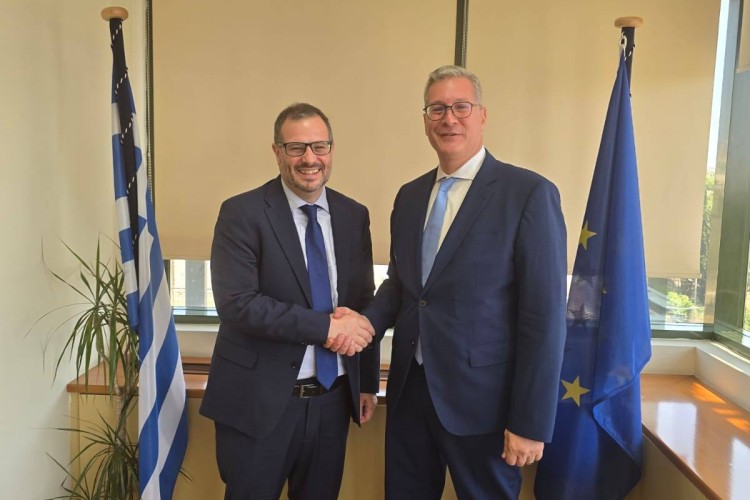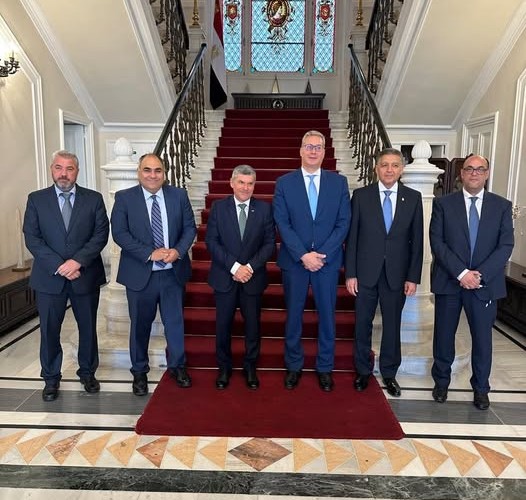Minister of Petroleum and Mineral Resources Karim Badawi attended the “Energy Transition: Eastern Mediterranean and Southeast Europe” Summit, held in the Greek capital Athens on June 17–18, 2025. Badawi participated as a keynote speaker in a panel discussion titled “Achieving Regional Synergy in a Transitional Energy Landscape” along with George Papanastasiou, Cypriot Minister of Energy, Commerce and Industry; and Tasos Chatzivasileiou, Greek Deputy Minister of Foreign Affairs.
During the session, Badawi underscored the Egyptian petroleum sector’s commitment to balancing energy security with environmental responsibility. He highlighted their strategic priorities, including boosting regional cooperation and maximizing infrastructure use. A key initiative in this balanced approach is a new agreement with the U.S. Trade and Development Agency (USTDA) and Global S&P to develop a roadmap for reducing methane emissions in Egypt’s oil and gas operations.
At the conclusion of the session, participants emphasized that as countries strive toward a sustainable energy future, the challenge of building clean, reliable, and affordable energy systems has become increasingly urgent and complex.
The summit gathered top executives, government leaders, and energy experts to share strategies and accelerate regional and global energy goals. It aimed to deliver actionable insights for building a competitive and sustainable energy ecosystem in the Eastern Mediterranean and Southeast Europe—a vital crossroads linking Europe, Africa, and the Middle East.

As a part of the visit to Athens, Badawi held a bilateral meeting with Nikos Tsafos, the Greek Deputy Minister of Energy. The meeting focused on fostering cooperation in the field of energy.
The two officials reviewed the latest advancements by technical working groups formed under the Memorandum of Understanding (MoU) between Egypt’s Ministry of Petroleum and Mineral Resources and Greece’s Ministry of Environment and Energy. The MoU outlines cooperation in liquefied natural gas (LNG), bilateral natural gas interconnection and trade, and enhanced exploration and production, all aimed at optimizing oil and gas resource utilization in the Mediterranean.
The discussions further explored strengthening energy infrastructure integration, leveraging both countries’ advanced capabilities in LNG liquefaction and regasification for mutual benefit. Furthermore, the two sides reviewed the latest in their carbon capture, utilization, and storage (CCUS) cooperation, alongside their respective efforts to expand renewable energy use and reduce carbon emissions from oil and gas production, all contributing to an optimal energy mix.

In a separate meeting, Badawi and the Cypriot Minister of Energy, George Papanastasiou, addressed the current status of connecting Cypriot gas fields to Egypt. Their discussion honed in on crucial aspects like pipeline routes, streamlining environmental and regulatory approvals, and ongoing marine surveys along the proposed pipeline paths.
Both sides stressed the importance of coordinating between their respective authorities to accelerate the timeline of bilateral tie-back projects. They also emphasized the need for continued high-level bilateral consultations to monitor progress within the technical working groups, which were established under the agreements signed last February during the opening of the Egypt Energy Show (EGYPES 2025).
Papanastasiou affirmed Cyprus’s objective to rapidly develop its Mediterranean fields by working closely with Egypt. He lauded Egypt’s integrated infrastructure and its ability to process Cypriot gas, seeing it as a crucial pathway for all involved to secure affordable energy.
Badawi, in turn, reiterated Egypt’s commitment to diversifying its energy supply sources, emphasizing that joint regional cooperation projects are the optimal path to securing and diversifying energy while creating added value for the region’s people. This perfectly aligns with Egypt’s strategic vision and the Ministry of Petroleum and Mineral Resources’ sixth pillar: transforming Egypt into a regional energy hub. He also expressed anticipation for the swift development of the “Cronos” and “Aphrodite” fields, viewing them as the cornerstone of this fruitful cooperation.
Concluding the meeting, participants agreed to intensify technical and executive consultations among their teams in the months ahead. They also committed to sustaining high-level meetings to oversee the latest advancements in the field development process, ultimately ensuring mutual economic benefit for all stakeholders.




